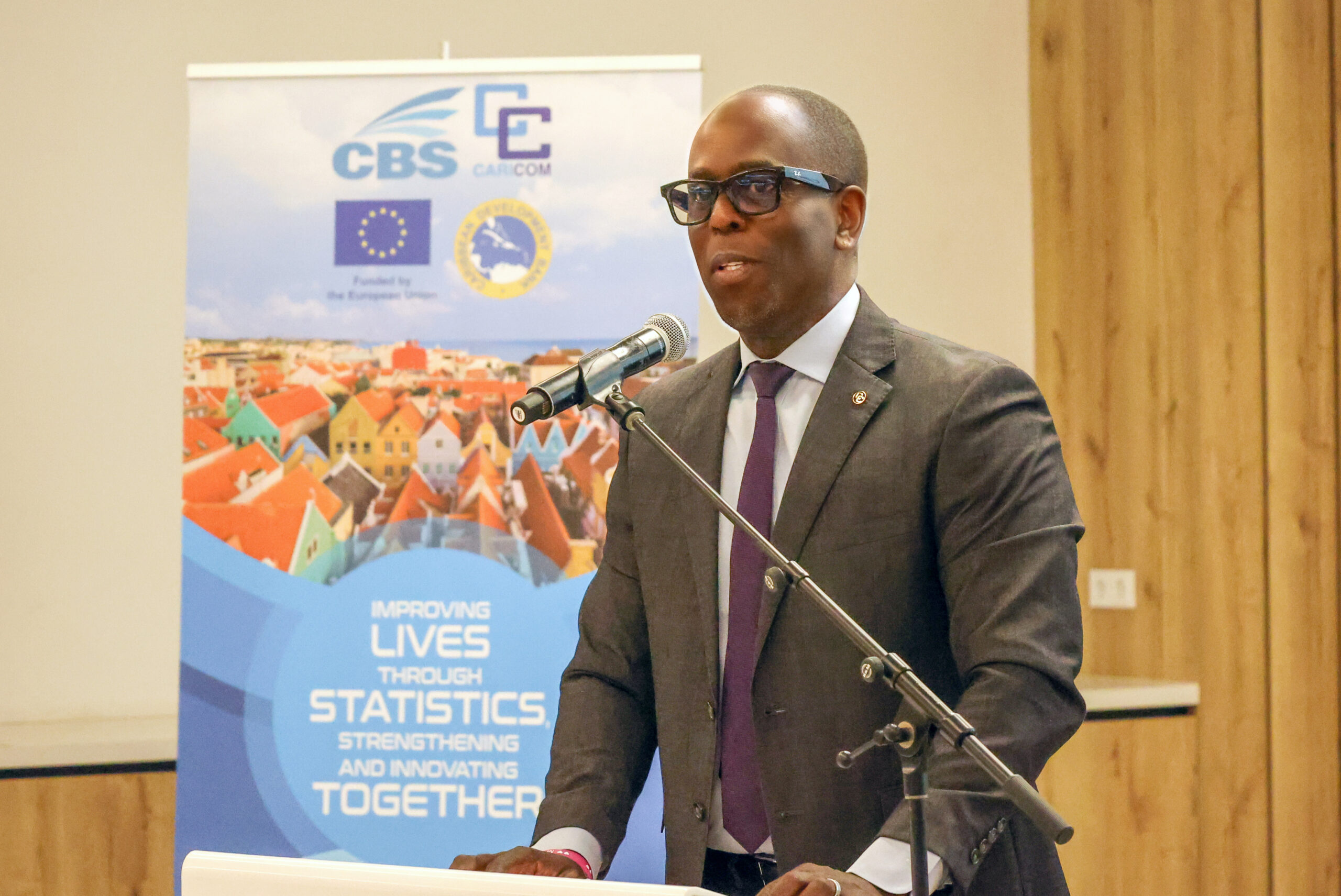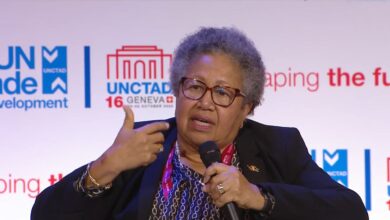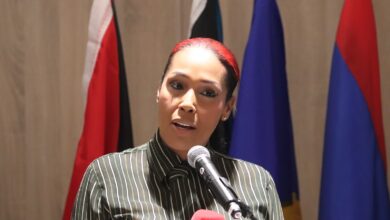Dr. Armstrong Alexis, CARICOM Deputy Secretary-General, called on statisticians, policymakers and partners to strategise on closing data gaps and scaling up innovative approaches to improve the statistical landscape in the Caribbean.
The Deputy Secretary-General spoke on Thursday, 30 October 2025, at the opening of Caribbean Data Day, which is hosted jointly by the CARICOM Secretariat and the World Bank as one of the series of statistics-related events in Willemstad, Curacao.
In his remarks, he referred to challenges Caribbean countries face in producing data to measure monetary and multi-dimensional poverty and vulnerability, especially those linked to climate change. The DSG emphasised the value of statisticians, policymakers, and international development partners meeting to deliberate and strategise on closing data gaps, and scaling up innovative approaches to improve the statistical landscape in the Caribbean.
The one-day event is aimed at exploring innovative approaches to address persistent data challenges. Its key focus will be on data needed to measure monetary and multidimensional poverty, track Sustainable Development Goals (SDGs), and provide insights into vulnerability and resilience, especially in relation to climate-related shocks.
There are four sessions: Poverty Analytics and Statistical Performance in the Caribbean; Regional Initiatives for Enhancing Statistical Capacity in the Caribbean; New and Improved Approaches for Measuring the SDG and Resilience; and Making Data Count for Policy: Using, Communicating and Disseminating Data.
Please read the remarks by the CARICOM Deputy Secretary-General:
I am honoured to once again be joining you for this annual gathering of regional Statisticians. When I assumed office as the Deputy Secretary General of the Caribbean Community in 2021, I took the decision to pay particular attention to the Regional Statistics Programme and to manifest my support by making myself available annually to stand side by side with you at your annual week of Statistics. I am therefore honored to be joining you once again, and in particular to be with you for this the opening of the Caribbean Data Day, a special feature of this year’s Meeting of the Standing Committee of Caribbean Statisticians (SCCS).
I begin by expressing solidarity with other Members States of CARICOM, particularly with Jamaica, Haiti, The Bahamas, and, fingers crossed, I will not have to add much more than this. But we all know that the ravages of Hurricane Melissa have brought destruction and devastation to our Member States, causing us to be even more concerned about the impact of the climate crisis on our countries, our people and our Region.
Just as any other successful mission, the desired result of eradicating poverty and inequality in all its forms across the CARICOM Region is better achieved if we join forces with others who share a similar desire. As the old saying goes, if you want to go fast, go alone. If you want to go far, go together. This adage is manifested in today’s collaborative venture, wherein, together with the World Bank we are providing a platform to you as leaders in Statistics in the Community to reflect on, respond to and shape the relevance of data in addressing some of the basic needs of our citizens.
You are no doubt aware that data is critical for measuring monetary and multidimensional poverty, tracking progress toward the Sustainable Development Goals (SDGs), and providing insights into understanding vulnerability and resilience, and I share your desire to one day see greater value placed on Statisticians as critical cornerstones to an evidence-based, data-driven, knowledge-seeking modern Caribbean society. I trust that through conversations like that which will be held today, we shall move closer towards building better appreciation for consistent systems to capture and report data that is essential for monitoring progress toward our shared goal of wholesome and comprehensive human development.
The challenges faced by many Caribbean countries in producing the data needed to measure monetary and multi-dimensional poverty and vulnerability, especially those linked to climate change, can never be over emphasised. I am therefore pleased that we have created this rare and valuable opportunity for statisticians, policymakers, and international development partners to come together, to deliberate and strategise on closing data gaps, and scaling up innovative approaches to improve the statistical landscape in the Caribbean.
The many interventions led by the Regional Statistics Programme at the CARICOM Secretariat contribute to a number of overarching objectives. As a Community, we remain steadfast to ending hunger and poverty. Our efforts have focused on boosting regional food production to reduce dependence on imports. The Community’s 25 by 25 initiative was designed specifically to reduce our food import bill by 25% by 2025 and though there were factors that mitigated against achieving this target, Member States have redoubled their efforts in the expanded 25 by 25 plus initiative with a new target set for 2030. Our lived reality in CARICOM has brought us face-to-face with the devastating effects of the climate crisis and although we have all committed to the Sustainable Development Goals we see how exogenous variables that we neither contribute to nor have control over, are adversely impacting our ability to meet these goals by 2030.
Despite the challenges that sometime may appear daunting, it is incumbent upon us to confront some critical questions:
- Are our national plans and policies driving the positive change we seek in poverty reduction, inequality, and sustainable development?
- How do we move from deliberation to action in strengthening our statistical systems to produce these critical datasets?
- How can we leverage our data to shape impactful policies? and
- How do we ensure sustained regional capacity for continuous and reliable production of high-quality data?
It is my sincere hope that today’s discussions will yield concrete recommendations and practical solutions to these pressing issues.
I wish to reiterate what I said in my opening remarks on Monday: that this Caribbean Data Day truly embodies the theme of this year’s meeting of the Standing Committee of Caribbean Statisticians, “Improving Lives through Statistics: Strengthening and Innovating Together.”
By promoting the production and use of high-quality data, driven by innovation and technology, we are empowering ourselves to create and implement policies that can sustainably transform the lives of the people of our Caribbean Community, ensuring a better, more prosperous future for all.
The future of how statistics and data usage in decision-making shape our Caribbean Community rests not only in the hands of statisticians. It is a collective undertaking of which statisticians serve multiple roles including that of champions, advocates, knowledgeable experts, guardians and custodians, and the more opportunity that is made available for you to lead in shaping a modern society that is driven by data, the closer we as a society will get to building that evidence-based, data-driven, knowledge-seeking future that I referred to earlier. I therefore thank you all for availing yourselves of the opportunity to share in today’s event. Your presence, your insights and your unwavering commitment to advancing the power of statistics in the Caribbean is critical if we are to build a future where no one is left behind.
Thank you for the opportunity to share in today’s experience with you, and thank you to the government and people of Curacao for being such gracious hosts of this week’s series of meetings. I wish you fruitful deliberations as you embark upon the business before you in today’s programme.
I thank you.






